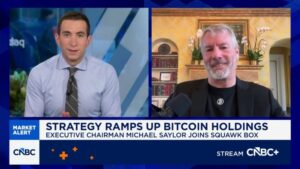There are plenty of headlines around at the moment warning of an impending stock market crash.
Many who are forecasting a looming catastrophic event point to an over-valued US stock market as evidence. They suggest that the S&P 500, with a trailing price-to-earnings (P/E) ratio of 27.8 — compared to its historical average, since 1990, of 23.3 — is too expensive and that investors will soon take fright.
Others are closely following the actions of Warren Buffett. His investment vehicle, Berkshire Hathaway, has been switching stocks for cash. At 30 September 2024, the company was sitting on a cash pile of $320bn. That’s an increase of $168bn in 12 months. If the American billionaire’s selling up then he must think a crash is coming, so the argument goes.
Indeed, the Buffett Indicator, which measures the value of the stock market relative to the US economy as a whole — a bit like a country-wide P/E ratio — is close to its record level. At 195.6, it’s more than double its 20-year historical average of 98.9.
Cheer up!
But I’m more positive.
The S&P 500 is currently inflated by the Magnificent Seven tech giants. Excluding these, the P/E ratio of the index falls below 20.
It’s true that stock market crashes have been preceded by extended bull runs. In 1987, Black Monday occurred after the Dow Jones Industrial Average had increased 250% over the previous five years. However, since November 2019, the S&P 500’s ‘only’ up 87%.
And Warren Buffett’s hinted that he’s been selling stocks for tax reasons rather than because he’s fearing the worst. Yes, his indicator is high. But it’s been climbing for several decades now. And he’s continued to hold stocks during many new highs, suggesting he doesn’t rely very much on his eponymous measure.
Slow and steady
Nor does Berkshire Hathaway appear to be focusing on defensive sectors — like utility stocks — that investors tend to buy when a period of instability is anticipated.
Defensives include shares like National Grid (LSE:NG.). It transmits and distributes electricity and gas in the UK and US. The demand for energy is largely unaffected by economic and financial turmoil.
Coupled with an absence of competition, it has certainty over its return on capital meaning it can confidently predict an annual 6%-8% increase in its earnings per share, through to 2029. And it plans to grow its dividend in line with inflation. Of course, there are no guarantees.
But it did surprise investors in June when it announced a £7bn rights issue. And it’s carrying a large amount of debt.
However, principally due to the reliability of its earnings, it’s the sort of stock I’d buy, if I thought a crash was coming.
Keep on going
Yet I’m not fearing the worst.
Don’t get me wrong, I’m sure there’s going to be another crash at some point over the remainder of my investing lifetime. History suggests there will be. And when it comes, the doomsters will claim credit for forecasting its arrival. After all, a broken clock is right twice a day.
But I’m going to keep on doing what I’ve always done. And that’s buy the stocks of well-managed companies — with strong balance sheets — which are likely to weather periods of market turmoil over the coming years and decades.
This post was originally published on Motley Fool







